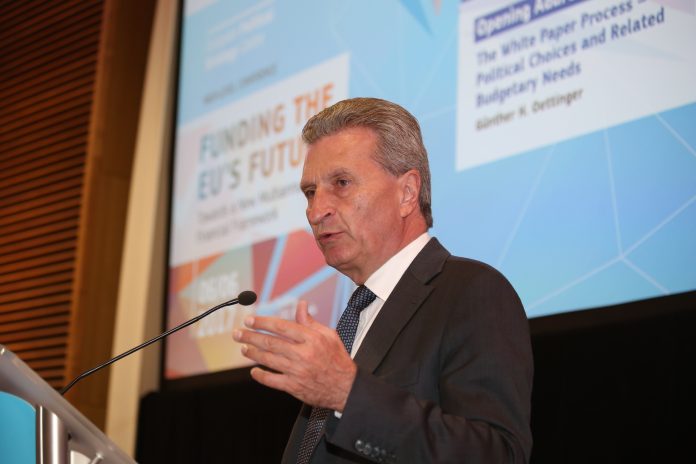Günther H. Oettinger European Commissioner in charge of budget and human resources European Commission
The latest statistics show eight million jobs created in the European Union since the current European Commission took office. At the same time, over the past two years the EU’s economic growth has surpassed that of the US. I’m convinced that the EU policies and budget have played an important part.
Doing more with less
The budgetary amounts we work with are not negligible while representing just 1% of GNI of the 28-member states. They are strictly defined by a 7-year financial framework. The current one runs until 2020 and for the first time in EU history is smaller than the previous one. When it was adopted in 2013 the European economy was still taking its first steps on the path to recovery, the unemployment rate was at its record high of 11% and we were facing a massive investment gap of about €700 billion per year. It was perfectly clear that if we wanted to live up to the expectations of European citizens, we needed to do more with less.
Shifting the focus towards results
An efficiency-guided approach was therefore of the utmost importance. We concentrated on improving planning and implementation and making sure that every euro spent brings real economic and social benefits. We have taken a variety of measures to associate even better the funds we allocate to the results achieved. We now have an improved performance framework, allowing for continuous monitoring and reviewing of the projects.
As about 80% of the EU funds are implemented by national and regional authorities, we have stepped up our collective efforts to ensure that efficiency is paramount all the way: from concept stage to completion. Right now, we are finalising a “spending review”, which will give us further insight into what else should be improved and how to better adjust our spending after 2020. This fits into the ongoing reflection process on the future of Europe, where EU finances play an important role.
Seeking to sustain economic growth and job creation
Our funding efforts so far have been concentrated on our political priorities, in particular to stimulate economic growth and job creation. Reinforcing the EU’s industrial leadership, catching-up in research and innovation and sharpening our competitive edge are of great importance, along with enhancing education and skills.
In the last three years the Horizon 2020 research and innovation programme has provided support to 340,000 researchers, leading to a number of scientific breakthroughs and discoveries. 17 Nobel Prize laureates have been funded by the EU budget before or after their award, and hundreds of innovative projects have been financed, resulting in a number of new patents and trademarks. We expect our Digital Single Market, also supported by the EU budget, to generate hundreds of thousands of new jobs. The resilient Energy Union we are building requires adequate infrastructure and we have already invested €1.7 billion in 96 electricity, smart grid and gas infrastructure projects.
Using the right instruments to multiply limited resources
For the first two years of its existence, the European Fund for Strategic Investment (EFSI), the so-called Juncker Plan, has triggered €225 billion of investment, supporting 300,000 jobs. This shows that by sharing the risk through a relatively small EU guarantee of €16 billion, we can mobilise serious private and public capital to work for EU citizens. Thousands of businesses, small and medium sized enterprises and start-ups have managed to acquire momentum, to expand and hire new employees. This means that we have put our money where our mouth is, and this approach is paying off.
EU budget success stories to be proud of
Targeted financing for our traditional polices is also yielding significant measurable results. Thanks to the European Social Fund and the Youth Employment Initiative 235,000 people were back in employment, 180,000 gained qualification, 100,000 received education or training by the end of 2016. 4% additional GDP growth was generated in the 12 countries that joined the EU after 2004, as a result of investment from the Cohesion policy and rural development funds. In 2016 alone, the EU budget supported about 7 million farmers. In the same year EU exports of agricultural and food products reached a new record level of €130 billion.
All this is only a small fraction of the measurable results achieved. And then there are those things we cannot measure: the impact of the EU being the world leader in humanitarian aid, for example, or saving thousands of lives in the Mediterranean. The same goes for funding cancer research or paying for fruit and vegetables for school-children across Europe. The list is a long one. And this is what the EU budget is all about: serving the EU citizens and adding value to their everyday lives.











